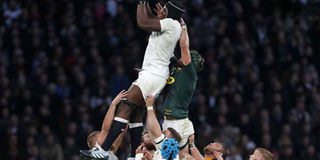Three things to look for in England v All Blacks Test

England's lock Maro Itoje claims the ball in the line-out during their international rugby union test match against South Africa at Twickenham stadium in south-west London on November 3, 2018. PHOTO | ADRIAN DENNIS |
What you need to know:
- Many observers felt that, at the very least, a penalty should have been given against the fly-half for an illegal 'no arms' shoulder charge, which would have allowed the Springboks a kick at goal to win the match.
LONDON
England face world champions New Zealand for the first time in four years at Twickenham on Saturday with fewer than 12 months left to the start of next year's World Cup in Japan.
Below AFP Sport looks at three of the main talking points ahead of a hugely anticipated fixture.
DANGEROUS TACKLES
Rugby Union's attempts to crack down on dangerous tackles in a bid to prevent head injuries have been a hot topic once again after England's Owen Farrell escaped censure, on or off the field, for his challenge on replacement Andre Esterhuizen in the closing moments of a tense 12-11 win over South Africa at Twickenham last weekend.
Many observers felt that, at the very least, a penalty should have been given against the fly-half for an illegal 'no arms' shoulder charge, which would have allowed the Springboks a kick at goal to win the match.
But Australian referee Angus Gardner, following consultation with the television match official, decided Farrell had made enough of an effort to avoid giving away a score.
There were widespread mutterings that had the incident taken place earlier in the game then a penalty would have been awarded, with some pundits even going so far as to suggest that a Pacific island player who committed such a tackle would certainly have been penalised.
Former New Zealand international Craig Dowd was scathing about the lack of action against Farrell, saying it was "a terrible tackle and the decision was an absolute disgrace and a blight on world rugby."
But current All Blacks fly-half Beauden Barrett, who has himself been on the receiving end of disciplinary action for dubious tackling, highlighted the confusion that surrounds the issue of dangerous tackling in general ahead of next year's World Cup in Japan by saying of the Farrell incident: "I still don't know what the right call was. I think there still needs to be a good physical contest in the game."
MORE PRESSURE ON THE REF
The Farrell tackle debate adds to the extra scrutiny that was already coming the way of referee Jerome Garces.
This weekend was already due to see the implementation of a new World Rugby trial for Tier One or elite level internationals that is meant to see more authority reverting back to the referee in the middle, who was traditionally the sole arbiter of fact in an era before the advent of the television match official.
There has long been a view that the TMO, once restricted to ruling on whether a try had been correctly scored, has become increasingly intrusive, with some referees calling for replays when they are not strictly required for fear of being shown up by the cameras.
In a game that already has enough stoppages due to injury, World Rugby want to up the tempo while restoring authority to the referee in the middle.
French official Garces is, however, one of the top referees in the game today and well used to having the spotlight on him.
ITOJE ON FOCUS
Few dispute Maro Itoje's natural gifts either as a lock or back-row but the way in which the Saracens star gave away several penalties against the Springboks last weekend was symptomatic of the poor discipline that has plagued England in recent matches.
It is hard to imagine England not being made to pay for a similarly high penalty count against the All Blacks.
But England coach Eddie Jones said of Itoje: "That boy is going to be one of the best players in the world.
"There's a fine edge between being super-competitive and giving away penalties. He's learning that all the time and it's just another part of his learning process."





